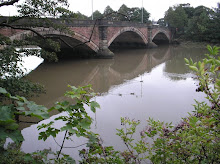Can you imagine the fuss if the author of the Harry Potter books, JK Rowling, had been born in Preston. There would be a blue plaque and, perhaps, the house would be open to the public. Well, in the first half of the 20th century an author was equally as successful in writing children’s boarding school books although they were about and for girls.
Angela Brazil ( for some reason pronounced Brazzle ) was born at 1, West Cliff here in Broadgate, the youngest of a family of four with two brothers and a sister, on the 30th November 1868. Her father Clarence worked in the Lancashire cotton trade and moved around this area as a result. Her mother, Angelica, was determined that her daughter would not be sent away to boarding school so she attended the Miss Knowle's Select Ladies School here in Preston.before moving to Wallasey.
Angela was over 30 before she began to publish with The Fortunes of Phillipa based on her mother’s experiences of boarding school. She went on to write 47 other school stories which brought her wealth and fame. She is credited with inventing the girls’ school genre although that is not strictly true. What she had though was determination and a prolific output.
Her best works are considered to be ‘ A Fourth Form Friendship’, A Pair of Schoolgirls’, ‘The Youngest Girl in the Fifth’ and ‘For the Sake of the School’. A typical synopsis of her work can be summed by ‘The Head Girl at the Gables’ published in 1919.
"Lorraine wasn’t head girl material – at least that’s how all the girls at The Gables felt. She was too quiet and withdrawn. But Miss Kingsley, the headmistress thought differently. So Lorraine was appointed and her hard struggle to win over the girls begins. She organizes a School Show, finds a new ally in the artistic Claudia and takes command in a surprisingly effective way. And woven into her school life is her newly discovered talent for painting – which leads to her the unmasking of a dangerous spy ring!"
Another original aspect of her publications are the covers which are colour and striking in their perception of girls having a life other than the stereotypical limp heroines of previous books for children. They are camping, trekking, adventurous, playing sport – not at all what the 1900’s had been used to being seen. No wonder they were such a spectacular hit with the young girls of the day. I’m not certain but I think that a copy of these early editions in good condition can fetch a decent price in the collector’s market.
One of the oddest things about Angela Brazil’s books is that at one time they were considered dangerous for young girls by Headmistresses with their slangy words like ‘ripping’ and ‘blossomy’. Unbelievably they were burnt to prevent them being read.
Other writers of childrens stories of the time nowadays attract adult enthusiasts but, it seems, that Brazil does not, possibly because she did not create stylish plots and characters ( according to Hilary Clare ) but when Brazil died in 1947 she had had an enormously successful career.
So that’s a brief summary of the books and life of Angela Brazil born in Broadgate.
Subscribe to:
Post Comments (Atom)

















No comments:
Post a Comment